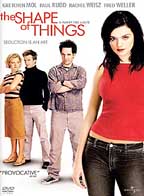FILM NOTES
FILM NOTES INDEX
NYS WRITERS INSTITUTE
HOME PAGE

(United States/France/United Kingdom, 2003, 96 minutes, color, 35mm)
Directed by Neil LaBute
Cast:
Rachel Weisz . . . . . . . . . . Evelyn
Paul Rudd . . . . . . . . . . Adam
Gretchen Mol . . . . . . . . . .Jenny
Frederick Weller . . . . . . . . . . Phillip
The
following film notes were prepared for the New York State Writers
Institute by Kevin Jack Hagopian, Senior Lecturer in Media Studies
at Pennsylvania State University:
In a hundred college art museums, a thousand college kids sleepily "guard" the paintings. In The Shape of Things, the vandal they never expect arrives, in the guise of a striking young art student. The attack she makes is motivated, not by hate, but by love: someone else, a guardian of morality, has fig-leaved a statue, and the young woman wishes to express her own ascetic love for the authentic spirit of beauty, unencumbered by convention. But this is a Neil LaBute film, and love in his work is the same kind of obsession that holds ex-wives hostages in trailer parks, deer rifles pressed to their spines… Neil LaBute's films are small, tight, even confined, electric little chamber pieces bearing the stamp of his own first love, the theater. (LaBute has divided his time between the theater and film, and many of his films, like The Shape of Things, are based on his own theatrical works.)
Was it Paul Goodman who said, "The young are always beautiful and cruel?" They are in The Shape of Things. Evelyn (Rachel Weisz), the art terrorist, is a classic Neil LaBute character, beautiful, young, and filled with bile, an Aphrodite with a switchblade. She forms an unlikely partnership with the hapless student and part-time guard Adam (Paul Rudd), and joins his circle of friends, Jenny and Philip. Evelyn's love is like hate, passionate, bitter, and obsessive. Her quick temper burns like magnesium in a dark room. Adam is soon scorched. Jenny and Philip notice that he seems to be bursting out of his cocoon, metamorphosing before their eyes into a man both more buff and ballsy than before. The shy Adam recedes, and a striking and confident Adam emerges. But like other psychologically costly transformations (David Cronenberg's The Fly, everyone's Dr. Jekyll and Mr. Hyde) Adams's is a Nietzchean makeover. He will lose more than he could ever hope to gain.
LaBute's films are uncompromising. For LaBute, the task of his films, often sardonic and darkly comic, is to be "socially observant and willing to be true to itself, true to its subject, rather than just worrying about how to get the audience to like it… when someone says, `Who do you find in the movie to be likable?,' I've never found it to be a requirement of writing that I have to provide people the audience would want to get a poster of, or would want to see a sequel to their story. I'd be hard-pressed to see who was so likable in The Godfather that people would want to see them again."
Along with Mike Leigh and David Mamet, LaBute is bringing back an affirmative, proud theatricalism to the movies. In sweeping long takes, withholding the parade of close-ups so beloved of directors who can't trust an actor's face to do its job, LaBute's most personal films, including In The Company of Men, Posession, and Your Friends and Neighbors, reconnect film with the art of the actor. In a dozen interviews, LaBute has loudly rejected the artifice of computer graphics and showy editing. The emotional intensity his portraits of loathing demand of actors like Rudd and Weisz, Gretchen Mol and Fred Weller, his ensemble from The Shape of Things, are special effects in themselves.
— Kevin Hagopian, Penn State University
For additional information, contact the Writers Institute at 518-442-5620 or online at https://www.albany.edu/writers-inst.
 The Shape of Things
The Shape of Things